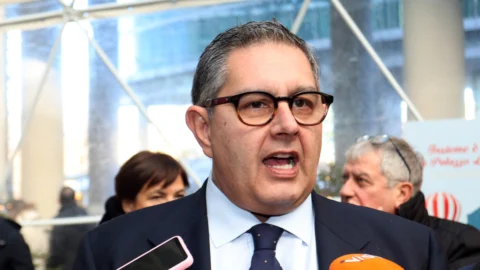Il 25 April 1945 the call for armed insurrection in the city of Milano, headquarters of the partisan command. For this reason that day was chosen by the National Liberation Committee as Liberation Day. This party is still divisive. If the responsibility of those who refuse to recognize the rebirth of Italy as a great free and democratic nation on that date is serious, it is equally serious to see the Resistance brandished - unfortunately it happens every year - like a club; as if certain political forces had the prerogative of recognizing or not a full right of citizenship to other political forces "daughters of a lesser God", despite being legitimized by the vote and having accepted the values of democratic competition.
After so many years, however, one should have the courage to tell the whole truth, while framing it in the difficult and cruel context of those times. The ferocity was not one-sided and it did not sell out in April 1945 or soon after. The fact that the winners (those who usually write history) were, fortunately, on the right side does not authorize anyone to deny - as has happened for too long - any understanding and pity for those who chose the side in those troubled years. wrong. Back then, it was very difficult for young people to have clear ideas, understand what was happening around them. Such serious decisions, such as to mortgage the fate of people, often depended on contingent circumstances. Indeed, by chance.
The story (fortunately not bloody) that I want to tell is that of two brothers, Antonio and Bruno, both born in a town in the Bolognese plain (Granarolo dell'Emilia), condemned by the war to formally become enemies. The first, the largest (from 1911), had fought, in infantry, all the wars of Fascism. The second (from 1920) was enlisted in Marina. The two brothers – what else could they do? – they were fascists, in the sense that they were not anti-fascists, like the vast majority of Italians. On 8 September 1943 he caught Antonio in Yugoslavia, with the rank of quartermaster sergeant; Bruno was embarked, as sub-chief torpedo operator, on the destroyer Centauro which was cruising in the Mediterranean.
Antonio, together with his company, he found himself framed in the Social Republic. The Italian troops, in that chessboard, had practically no alternatives, other than to end up like the fallen of Kefalonia or to join the Tito partisans, with the certainty of being shot. Both former friends and former enemies would not be generous in such situations. Under the guidance of a good captain, highly esteemed by his soldiers, Antonio's company hid in the German rear, withdrew with them until, once they arrived in Austria, they managed to surrender to the British.
Bruno, instead, was inserted in the Badogliano Army, in the San Marco Battalions, fought with the allies, moving up the peninsula, until participating in the Liberation of Bologna. Immediately after the war, the older brother's family moved to Bologna, where Antonio could go unnoticed. In the village the air had become heavy (so much so that he was purged from his job), but Antonio could count on the help and protection of relatives and friends, including the active solidarity of his brother Bruno. Unfortunately, he was discharged without being awarded the promotion to which he was entitled (in practice he was punished) and the war years were not recognized for retirement purposes.
After all Antonio did well. After the first difficult periods, when legality was re-established thanks to the victory of the democratic forces in 1948, he was allowed to return to his native village on Sundays to visit a large part of his family who lived there. But the poisons remained. At the end of the sixties, Antony's son (who in the meantime had died prematurely in 1965) went to the town in the Bolognese plain to participate in a debate, representing the PSI (the party to which he was a member), but had to face the challenge of a small group of people who accused him to be"son of a fascist".
Antonio and Bruno have been resting in peace for a long time. The hatred of politics (of which they were guilty) never weakened the brotherly love that bound them. Antonio was my father; Bruno my uncle. I, who have been a socialist and anti-fascist all my life, like almost all the members of the family, have long considered that (forced) placement of my father in the field of the vanquished as an original sin, to be hidden even from myself. A cowardly act that I regretted, because I respected and loved my father very much, who left me when I was only 24 years old. Since then, there hasn't been a single day – including April 25 – that I haven't thought about him.





